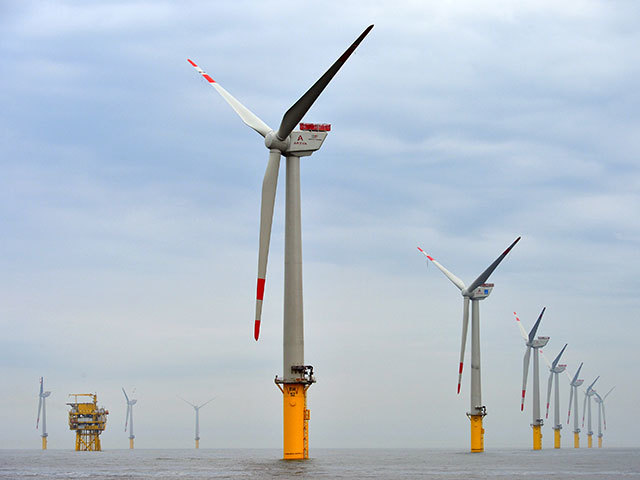
Germany wants to accelerate the expansion of offshore wind energy by removing environmental impact assessments that sometimes delay projects.
Unless neighboring states are significantly affected, such checks should in most cases no longer be required for the approval and operation of turbines at sea, according to a draft law from the economy ministry seen by Bloomberg. While the government is under pressure to accelerate offshore wind expansion, the plan is likely to spark outrage from conservationists.
Europe’s largest economy and its biggest polluter — which phased out nuclear power last year — aims to achieve 80% green power production by 2030, up from 50% now, which means offshore deployment needs to more than triple to 30 gigawatts. By 2045, when the country aims to be climate neutral, Germany even wants to have an offshore capacity of 70 gigawatts.
As the country similarly struggles to expand its grid, the economy ministry’s draft law also includes speedier approvals for offshore connections and power lines. The measure also seeks to implement provisions of the European Union’s renewable directive, which asks member states to cut a lot of red tape.
The document says that in most cases, a separate inspection of impacts on wildlife and protected species during the construction phase is no longer needed. Most of the environmental checks should be done by the Federal Maritime and Hydrographic Agency, the authority which is charged with designating the offshore wind areas, which critics could see as a conflict of interest.
In a snub to environmentalists, Chancellor Olaf Scholz’ three-party coalition last month also decided to cut funds set aside for marine nature conservation and fishing — proceeds from last year’s record offshore wind auctions — to help plug the nation’s budget hole.
Other aims of the early draft proposal include declaring the production of hydrogen at sea in the “overriding public interest.” That would help speed up approvals for electrolyzers near offshore wind farms, part of the nation’s far-reaching plans to push the green gas. A recent industry study said hydrogen production could become significant — mainly in the North Sea.
Reaction to Measure
While offshore wind farms operators welcomed efforts to accelerate the technologies, the government “should proceed with a sense of proportion,” said Stefan Thimm, managing director of the industry group known as the BWO. For ocean areas that have not yet been investigated by the state, environmental impact studies and assessments should be part of the approval procedure, he added.
The Nature And Biodiversity Conservation Union, Germany’s largest environmental group with almost a million members, said it’s “very concerned” about the bill.
“Acceleration cannot be achieved by lowering environmental standards,” said Dominik Auch, the group’s Marine Protection Officer. The government must “stop turning nature conservation into an opponent of climate protection and industrial transformation.”
The draft still has to be reviewed by other ministries and pass through parliament, which means it can still be tweaked.
A spokesperson for the economy ministry did not respond to a request for comment.
Recommended for you

 © Source: Deutsche WindGuard
© Source: Deutsche WindGuard